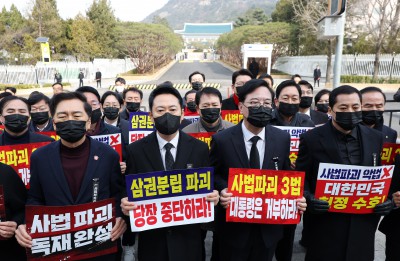(2부에 이어서)
Tonight, I propose a "Fix-It-First" program to put people to work as soon as possible on our most urgent repairs, like the nearly 70,000 structurally deficient bridges across the country. And to make sure taxpayers don't shoulder the whole burden, I'm also proposing a Partnership to Rebuild America that attracts private capital to upgrade what our businesses need most: modern ports to move our goods; modern pipelines to withstand a storm; modern schools worthy of our children. Let's prove that there is no better place to do business than the United States of America. And let's start right away.
Part of our rebuilding effort must also involve our housing sector. Today, our housing market is finally healing from the collapse of 2007. Home prices are rising at the fastest pace in six years, home purchases are up nearly 50 percent, and construction is expanding again.
But even with mortgage rates near a 50-year low, too many families with solid credit who want to buy a home are being rejected. Too many families who have never missed a payment and want to refinance are being told no. That's holding our entire economy back, and we need to fix it. Right now, there's a bill in this Congress that would give every responsible homeowner in America the chance to save $3,000 a year by refinancing at today's rates. Democrats and Republicans have supported it before. What are we waiting for? Take a vote, and send me that bill. Right now, overlapping regulations keep responsible young families from buying their first home. What's holding us back? Let's streamline the process, and help our economy grow.
These initiatives in manufacturing, energy, infrastructure, and housing will help entrepreneurs and small business owners expand and create new jobs. But none of it will matter unless we also equip our citizens with the skills and training to fill those jobs. And that has to start at the earliest possible age.
Study after study shows that the sooner a child begins learning, the better he or she does down the road. But today, fewer than 3 in 10 four year-olds are enrolled in a high-quality preschool program. Most middle-class parents can't afford a few hundred bucks a week for private preschool. And for poor kids who need help the most, this lack of access to preschool education can shadow them for the rest of their lives.
Tonight, I propose working with states to make high-quality preschool available to every child in America. Every dollar we invest in high-quality early education can save more than seven dollars later on – by boosting graduation rates, reducing teen pregnancy, even reducing violent crime. In states that make it a priority to educate our youngest children, like Georgia or Oklahoma, studies show students grow up more likely to read and do math at grade level, graduate high school, hold a job, and form more stable families of their own. So let's do what works, and make sure none of our children start the race of life already behind. Let's give our kids that chance.
Let's also make sure that a high school diploma puts our kids on a path to a good job. Right now, countries like Germany focus on graduating their high school students with the equivalent of a technical degree from one of our community colleges, so that they're ready for a job. At schools like P-Tech in Brooklyn, a collaboration between New York Public Schools, the City University of New York, and IBM, students will graduate with a high school diploma and an associate degree in computers or engineering.
We need to give every American student opportunities like this. Four years ago, we started Race to the Top – a competition that convinced almost every state to develop smarter curricula and higher standards, for about 1 percent of what we spend on education each year. Tonight, I'm announcing a new challenge to redesign America's high schools so they better equip graduates for the demands of a high-tech economy. We'll reward schools that develop new partnerships with colleges and employers, and create classes that focus on science, technology, engineering, and math – the skills today's employers are looking for to fill jobs right now and in the future.
Now, even with better high schools, most young people will need some higher education. It's a simple fact: the more education you have, the more likely you are to have a job and work your way into the middle class. But today, skyrocketing costs price way too many young people out of a higher education, or saddle them with unsustainable debt.
Through tax credits, grants, and better loans, we have made college more affordable for millions of students and families over the last few years. But taxpayers cannot continue to subsidize the soaring cost of higher education. Colleges must do their part to keep costs down, and it's our job to make sure they do. Tonight, I ask Congress to change the Higher Education Act, so that affordability and value are included in determining which colleges receive certain types of federal aid. And tomorrow, my Administration will release a new "College Scorecard" that parents and students can use to compare schools based on a simple criteria: where you can get the most bang for your educational buck.
To grow our middle class, our citizens must have access to the education and training that today's jobs require. But we also have to make sure that America remains a place where everyone who's willing to work hard has the chance to get ahead.
Our economy is stronger when we harness the talents and ingenuity of striving, hopeful immigrants. And right now, leaders from the business, labor, law enforcement, and faith communities all agree that the time has come to pass comprehensive immigration reform.
Real reform means strong border security, and we can build on the progress my Administration has already made – putting more boots on the southern border than at any time in our history, and reducing illegal crossings to their lowest levels in 40 years.
Real reform means establishing a responsible pathway to earned citizenship – a path that includes passing a background check, paying taxes and a meaningful penalty, learning English, and going to the back of the line behind the folks trying to come here legally.
And real reform means fixing the legal immigration system to cut waiting periods, reduce bureaucracy, and attract the highly-skilled entrepreneurs and engineers that will help create jobs and grow our economy.
In other words, we know what needs to be done. As we speak, bipartisan groups in both chambers are working diligently to draft a bill, and I applaud their efforts. Now let's get this done. Send me a comprehensive immigration reform bill in the next few months, and I will sign it right away.
But we can't stop there. We know our economy is stronger when our wives, mothers, and daughters can live their lives free from discrimination in the workplace, and free from the fear of domestic violence. Today, the Senate passed the Violence Against Women Act that Joe Biden originally wrote almost 20 years ago. I urge the House to do the same. And I ask this Congress to declare that women should earn a living equal to their efforts, and finally pass the Paycheck Fairness Act this year.
We know our economy is stronger when we reward an honest day's work with honest wages. But today, a full-time worker making the minimum wage earns $14,500 a year. Even with the tax relief we've put in place, a family with two kids that earns the minimum wage still lives below the poverty line. That's wrong. That's why, since the last time this Congress raised the minimum wage, nineteen states have chosen to bump theirs even higher.
Tonight, let's declare that in the wealthiest nation on Earth, no one who works full-time should have to live in poverty, and raise the federal minimum wage to $9.00 an hour. This single step would raise the incomes of millions of working families. It could mean the difference between groceries or the food bank; rent or eviction; scraping by or finally getting ahead. For businesses across the country, it would mean customers with more money in their pockets. In fact, working folks shouldn't have to wait year after year for the minimum wage to go up while CEO pay has never been higher. So here's an idea that Governor Romney and I actually agreed on last year: let's tie the minimum wage to the cost of living, so that it finally becomes a wage you can live on.
Tonight, let's also recognize that there are communities in this country where no matter how hard you work, it's virtually impossible to get ahead. Factory towns decimated from years of plants packing up. Inescapable pockets of poverty, urban and rural, where young adults are still fighting for their first job. America is not a place where chance of birth or circumstance should decide our destiny. And that is why we need to build new ladders of opportunity into the middle class for all who are willing to climb them.
Let's offer incentives to companies that hire Americans who've got what it takes to fill that job opening, but have been out of work so long that no one will give them a chance. Let's put people back to work rebuilding vacant homes in run-down neighborhoods. And this year, my Administration will begin to partner with 20 of the hardest-hit towns in America to get these communities back on their feet. We'll work with local leaders to target resources at public safety, education, and housing. We'll give new tax credits to businesses that hire and invest. And we'll work to strengthen families by removing the financial deterrents to marriage for low-income couples, and doing more to encourage fatherhood – because what makes you a man isn't the ability to conceive a child; it's having the courage to raise one.
Stronger families. Stronger communities. A stronger America. It is this kind of prosperity – broad, shared, and built on a thriving middle class – that has always been the source of our progress at home. It is also the foundation of our power and influence throughout the world.
(계속)
[뉴스핌 Newspim]























